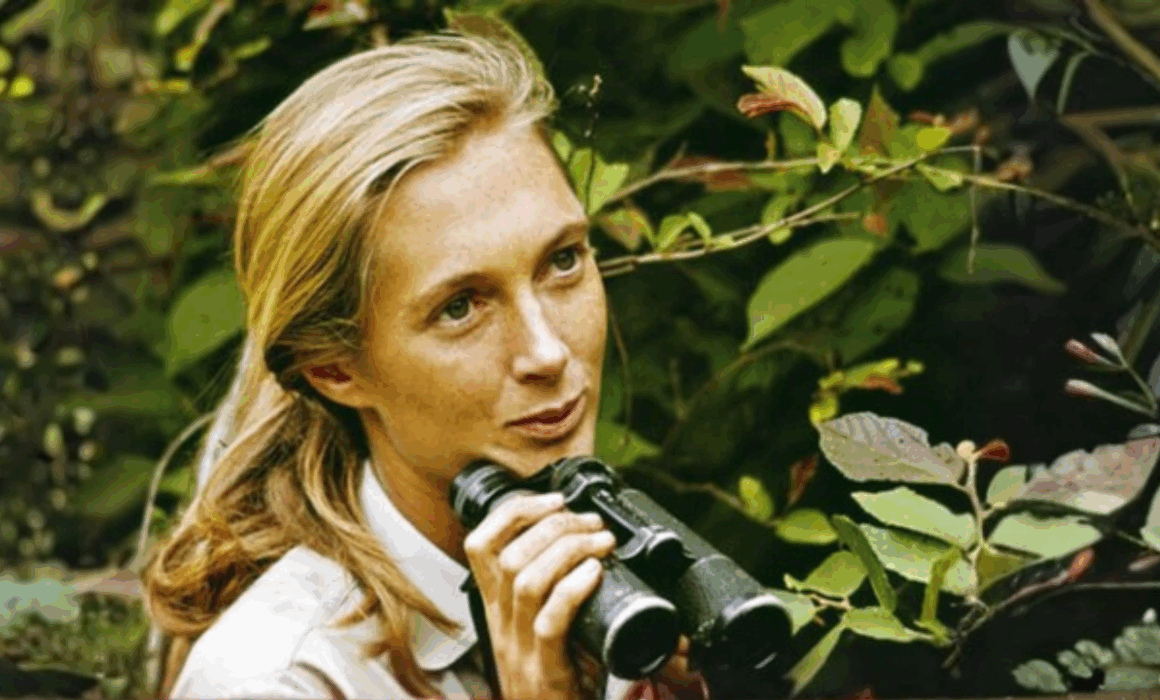Jane Goodall, Whiskey and Wine
By: Virginie Boone
The legendary Dr. Jane Goodall was well known to be fond of Irish whiskey, but through her message of sustainability, she also inspired many in the world of wine.
The Goodwill Wine Partnership in Australia has raised half a million for the Jane Goodall Institute (JGI) through wine sales. JGI itself created a line of Gombe Botanicals glassware etched with plant species made from recycled wine bottles collected from bars and restaurants.
The English-born primatologist and conservationist passed away last week at the age of 91, multiple decades after her pioneering years as a young woman studying chimpanzees in the forests of Tanzania (then in what was still a British colony called Tanganyika).
She was chosen to do the work by Kenyan-British paleoanthropologist and archaeologist Louis Leakey, who wanted someone without a college education who would come to this work with their eyes and mind fully open and unbiased. Leakey also felt a woman might be more patient in the field in absolute silence. The year was 1960. She was 26 and had to have a chaperone, so her mother came along.
She was a remarkable observationist and made extraordinary discoveries about the animal world, starting with chimps’ ability to make and use tools at a time when it was believed that only humans were toolmakers. She also famously documented the wide range of emotions of the chimps and the complex groups they formed, that they were thinking creatures with active minds.
She went on in 1977 to found the Jane Goodall Institute for Wildlife Research & Conservation with community-led chapters around the world to work on conservation and improve human well-being, including Roots & Shoots, an effort to bring up the next generation of global changemakers. She also became a UN Messenger of Peace.
Goodall’s impact was gigantic across the world, in science and in life. Wine science writer Erika Szymanski, a graduate student at the Centre for Science and Communication at the time, found several lessons she could apply to winemaking after attending a Goodall lecture in 2014.
The first was you don’t need fabulous technology to do fabulous things – “When Dr. Goodall first began studying chimpanzees, she famously went out into the forest with a pencil, a notebook, and what she describes as a pair of not-very-good second-hand binoculars,” Szymanski wrote. “Though far from the only person to have made excellent breakthroughs with minimal technology, she’s a good reminder that not only can it be done, it can be done with spectacular success.”
The same logic follows with wine, where good winemaking remains about making careful observations both in the vineyard and in the winery.
Goodall had no formal education when she started studying chimps. She didn’t know what she didn’t know. “Making the best wine and having the best education don’t always go hand-in-hand,” Szymanski stated. “Lack of training actually made Goodall a better scientist. Why? Because established theories about what she should see didn’t obstruct her ability to make astute, detailed observations.”
But also applicable to the wine world was Goodall’s approach to communication. Asked what had contributed to her success as a communicator, Goodall often responded how important it was to convince people through stories, to tell stories to get people to see you how feel and how to listen.
“You’ve got to reach the heart and how do you reach the heart?” Goodall asked aloud in the Wiser Than Me podcast last year hosted by Julia Louis-Dreyfus. “With stories. A little story that might reach the heart and find common ground.”
Goodall said in interviews that she drank a whiskey, neat, that it was a ritual, the drink able to soothe her vocal cords and her mind.
“I drink a whiskey every night,” she told The Guardian in 2023, “Mum and I used to have a small glass together at home. As I travelled more, we’d each raise a glass at our respective 7 pms. It was a way to feel connected. Now I toast her up in the clouds every evening.”
On the road 300 days a year into her 90s she spread her message of hope around the world, telling stories to get people to change from within and do something, no matter how small.
“This is what Goodall did toward the end of her extraordinary life,” remembered reporter David Gelles in last week’s The New York Times. “She talked. To anyone who would listen. To presidents and preschoolers. In classrooms and at keynotes. She was indefatigable, traveling restlessly and imploring humanity to protect the natural world.”
Goodall was “full of quiet energy… gentle and sharp.” She believed her most important work was about finding “connection and reaching the heart,” she once said. “I think if we use head and heart together, we can achieve our true human potential.”
In the end, wine can help connect and reach the heart, every farmer, winemaker and wine drinker able to do their part.
Her most famous quote says it all: “You cannot get through a single day without having an impact on the world around you. What you do makes a difference, and you have to decide what kind of difference you want to make.”
Photo By: The Jane Goodall Institute


